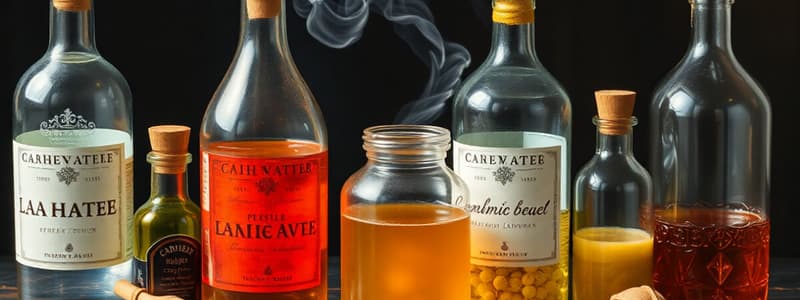Podcast
Questions and Answers
What are spirits?
What are spirits?
Spirits are solutions of volatile substances in alcohol, usually containing a volatile oil.
Spirits are alcoholic or hydro-alcoholic solutions prepared by simple solution or by ______ of ingredients.
Spirits are alcoholic or hydro-alcoholic solutions prepared by simple solution or by ______ of ingredients.
admixture
What is the primary medicinal use of aromatic ammonia spirit?
What is the primary medicinal use of aromatic ammonia spirit?
- Expectorant
- Antacid (correct)
- Pain relief
- Carminative (correct)
Which spirit contains the highest percentage of alcohol?
Which spirit contains the highest percentage of alcohol?
What process is used to prepare peppermint spirit?
What process is used to prepare peppermint spirit?
Water is encouraged during the preparation of spirits.
Water is encouraged during the preparation of spirits.
What is the primary medicinal action of aromatic ammonia spirit?
What is the primary medicinal action of aromatic ammonia spirit?
Compound orange spirit is primarily used as a ______.
Compound orange spirit is primarily used as a ______.
What happens to aromatic ammonia spirit upon dilution with water?
What happens to aromatic ammonia spirit upon dilution with water?
Why are spirits sometimes used externally?
Why are spirits sometimes used externally?
Flashcards
Spirits Definition
Spirits Definition
Solutions of volatile substances in alcohol, typically containing volatile oils. Used as flavorings and sometimes medicinally.
Aromatic Ammonia Spirit
Aromatic Ammonia Spirit
A spirit containing ammonia, ammonium carbonate, and fragrant oils (lemon, lavender, nutmeg). Used as a carminative, antacid and circulatory stimulant.
Camphor Spirit
Camphor Spirit
A high-alcohol (80-87%) solution of camphor, used externally for cold sores, as a circulatory stimulant and a mild expertorant..
Compound Orange Spirit
Compound Orange Spirit
Signup and view all the flashcards
Peppermint Spirit
Peppermint Spirit
Signup and view all the flashcards
Preparation of Spirits (Simple Solution)
Preparation of Spirits (Simple Solution)
Signup and view all the flashcards
Maceration (Spirit)
Maceration (Spirit)
Signup and view all the flashcards
Distillation (Spirit)
Distillation (Spirit)
Signup and view all the flashcards
Spirits vs Elixirs
Spirits vs Elixirs
Signup and view all the flashcards
Alcohol content of Spirits
Alcohol content of Spirits
Signup and view all the flashcards
Study Notes
Spirits (Solutions containing mixed solvent system)
- Spirits are solutions of volatile substances in alcohol.
- The volatile substance is usually a volatile oil.
- The contents in spirits are more concentrated than in aromatic water.
- Spirits are alcoholic or hydro-alcoholic solutions.
- These solutions are prepared by simple solution or by mixing ingredients.
- Alcoholic concentration is typically over 60%.
- Spirits are used as flavoring agents and may have medicinal value.
Uses of Spirits
- Used as flavoring agents.
- Used medicinally for the therapeutic value of the aromatic solute.
- Can be taken orally (e.g., Aromatic Ammonia spirit), often mixed with water to reduce pungency.
- Can be applied externally (e.g., Camphor spirit).
- Can be used via inhalation.
Preparation of Spirits
- Preparation methods depend on the materials:
- Simple solution
- Maceration
- Distillation
- Water is avoided during preparation to prevent precipitation of insoluble volatile oils (unless specifically mentioned in the formula).
- Equipment should be dry.
- Filter paper should be moistened with alcohol (minimum 60% alcohol).
Official Spirits
- Aromatic ammonia spirit NF
- Camphor spirit NF
- Compound orange spirit USP
- Peppermint spirit NF
Aromatic Ammonia Spirit NF (Rx)
- Solution of ammonia and ammonium carbonate in alcohol and distilled water.
- Perfumed with lemon, lavender, and nutmeg oils.
- Contains the lowest percentage of alcohol (62-68%).
- Acts as a carminative (due to volatile oils), antacid, and mild reflex circulatory stimulant (used for fainting).
- Forms a milky preparation upon dilution with water due to oils.
- Typically colorless, but may turn pale amber upon standing (due to oxidation of oils).
Camphor Spirit NF
- Also known as tincture of camphor.
- Contains the highest percentage of alcohol (80-87%).
- Simple solution of 10% camphor in alcohol.
- Used externally and internally.
- Applied to cold sores.
- Acts as a mild reflex circulatory stimulant.
- Acts as a mild expectorant.
Compound Orange Spirit USP
- Primarily used as a flavoring agent.
- Blend of several oils.
- Readily prepared by simple solution.
- Important ingredient of aromatic elixir.
Peppermint Spirit NF
- Used as a carminative and flavoring agent.
- Leaves are macerated in water to remove tannins, xanthophyll, and water-soluble principles.
- The water is discarded, and the leaves are macerated in alcohol to dissolve the chlorophyll (green pigment).
- 10% volatile oil is added to the alcoholic solution.
- Leaves themselves don't provide medicinal action; the medicinal properties come from the added volatile oil.
- Many commercial products are colorless but have the same therapeutic value as those that conform to NF specifications (requiring the green color).
Differences between Spirits and Elixirs
(This section is a question, not information from the provided text).
Studying That Suits You
Use AI to generate personalized quizzes and flashcards to suit your learning preferences.




